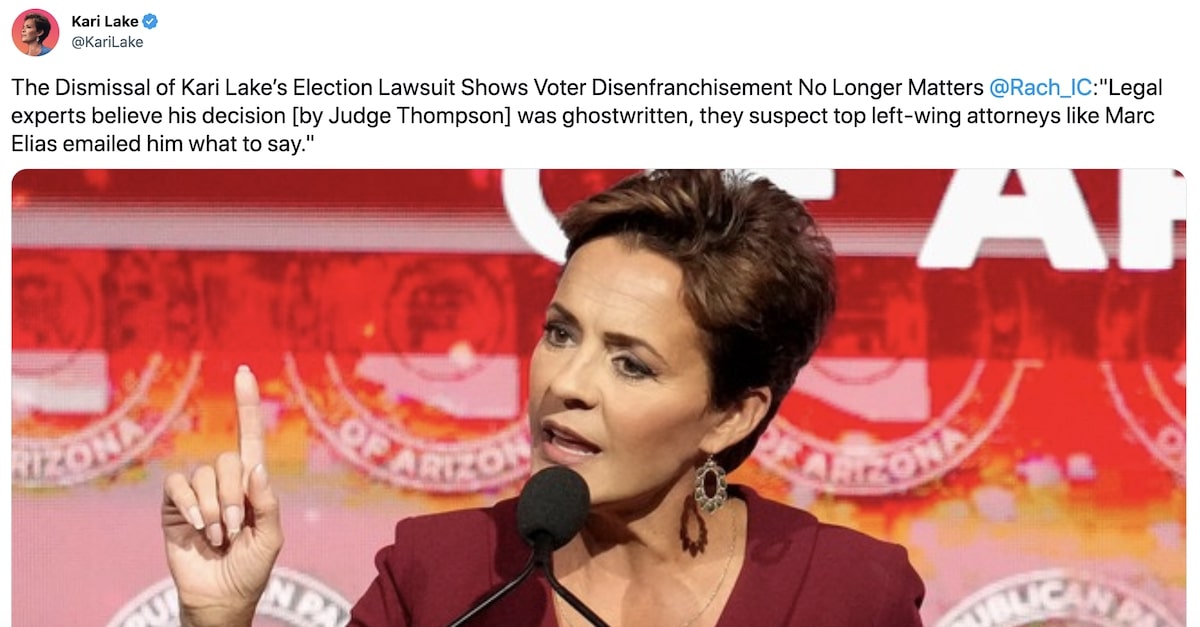
Defeated Arizona gubernatorial candidate Kari Lake apparently deleted this tweet attacking her opposing counsel and the judge who dismissed her election lawsuit. (Screengrab of deleted tweet via Archive.org)
After losing her lawsuit seeking to reverse her 17,117-vote defeat in a judge’s blistering ruling, failed Arizona gubernatorial candidate Kari Lake boosted a conspiracy theory that the outcome had been “ghostwritten” by a Democratic party lawyer.
“The Dismissal of Kari Lake’s Election Lawsuit Shows Voter Disenfranchisement No Longer Matters,” Lake posted on her official Twitter account early on Monday morning, quoting a right-wing pundit’s speculation about her defeat.
That was the headline of commentator Rachel Alexander’s op-ed for the conservative website Townhall attacking presiding Maricopa County Superior Court Judge Peter Thompson.
“Legal experts believe his decision [by Judge Thompson] was ghostwritten, they suspect top left-wing attorneys like Marc Elias emailed him what to say,” the editorial asserted. It didn’t specify the purported experts or what evidence supposedly supported the theory.
Though Lake apparently deleted the tweet, the Internet Archive database captured it, and it’s now the subject of sparring in a sanctions motion for more than $500,000 filed against the pro-Donald Trump candidate and her lawyers.
“Plaintiff’s claims were also made in bad faith, as demonstrated by her scattershot approach to litigation, her claims’ lack of legal and factual merit, and this action’s place as part of a larger scheme carried out by Plaintiff to spread disinformation about elections and election results in Maricopa County,” Deputy Maricopa County Attorney Thomas P. Liddy wrote. “And she has not stopped.”
“Despite this Court’s ruling finding that Plaintiff had utterly failed to prove any of her claims […] Ms. Lake attacked this Court’s integrity,” Liddy added, citing Lake’s tweet.
Arizona’s Governor-elect Katie Hobbs (D) joined Maricopa County’s motion for sanctions — and filed one of her her own seeking $550,210 in fees, the vast majority of which (at $457,032.50) would go to their attorneys at the Elias Law Group. That is the firm founded by Democratic party lawyer Marc Elias, who helped defeat Trump’s post-election litigation in 2020. He’s also the same attorney roped into the conspiracy theory that Lake boosted to explain her legal defeat.
The sanctions motions target both Lake and her lawyers, who potentially would be on the hook for the legal fees and expenses of multiple defendants.
Late on Monday, Lake filed a response to the sanctions motions calling that outcome unwarranted.
“Defendants cite no case law that supports sanctions based on Twitter posts,” Lake’s lawyer Bryan James Blehm, one of the targets of the sanctions motion, wrote. “Plaintiff has a First Amendment right to voice her opinions.”
Blehm also noted that the deleted tweet in question quoted someone else’s words.
“Tweets, especially those authored by others, do not support sanctions under Arizona law,” the defense memo continued.
That tweet was hardly the only one flagged by Maricopa County in their sanctions motion. Others featured Lake’s interview with convicted Trump associate Steve Bannon, including one that included a fundraising link.
She retweeted another by conservative group Turning Point Action stating: “My pronouns are: I/Won.”
Former federal prosecutor Mitchell Epner, who is now a partner at Rottenberg Lipman Rich, also noted that Lake told her supporters to pray for her legal team because they may get sanctioned. He called those remarks ill-advised.
“These comments make it clear that Ms. Lake and her attorneys were aware that their arguments and purported evidence would likely trigger the very high bar for sanctions, and went ahead anyway,” Epner said. “This sort of scienter (bad intent) is rarely documented and plays a big role in the decision on sanctions. Good faith arguments rarely get sanctioned. Knowingly sanctionable arguments do get sanctioned.”
Lake’s other lawyers were sanctioned after a similar federal lawsuit was dismissed. The only member of her legal team facing the possibility of sanctions in both actions is Washington, D.C.-based lawyer Kurt B. Olsen.